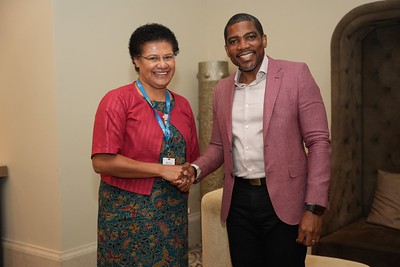Expert Insight by: Arieta Gonelevu Rakai, Regional Programme Officer, Islands, IRENA
Considering the deepening global climate crisis, the urgent call for action to accelerate energy transition from Small Island Developing States (SIDS) has grown louder, especially since they are most vulnerable to the impacts of climate change. Tapping into the rich potential of the small island states’ diverse renewable energy sources accompanied with energy efficiency measures and innovative solutions will not only bolster energy security and climate resilience, but also contribute to sustainable development.
By utilising the global stage through international frameworks like the SIDS Accelerated Modalities of Action (SAMOA) Pathway for instance, SIDS are exemplifying leadership in sustainable development and climate action. Such frameworks underscore SIDS’ dedication to address their unique challenges and safeguard the islands that they call home, from disappearing due to rising sea-levels and other climate-related threats. Their national strategies also reflect ambitious targets that aim to achieve the Paris Agreement while ensuring that no one is marginalised in the process.
To achieve the national targets set in the SIDS national energy policies and those reflected in the Nationally Determined Contributions (NDCs), tailoured and accessible financing is needed. According to an analysis by the International Renewable Energy Agency (IRENA) on the updated NDCs, a minimum investment of US$10.5 billion is required to meet the additional capacity target of 7.4 GW by 2030, of which 3.2 GW is dependent on external financial assistance.
Strategic engagements and partnerships are keys to facilitating tailored support for human, technical and financial capacity that will build bridges towards the achievement of comprehensive sustainable energy future in SIDS. Partnerships such as the SIDS Lighthouses Initiative (LHI), which is coordinated by IRENA, contribute to capacity development and access to affordable finance. The LHI has been building bridges between SIDS and development partners since 2014, expanding partner engagements and leveraging energy transition synergies with other initiatives to maximise benefits for SIDS.
With 41 SIDS and 47 partners, the Initiative has been monitoring the progress of renewable energy deployment in SIDS, which reached 8.7 GW of installed capacity by 2023. The 40 SIDS (COP Parties) that ratified the Paris Agreement accounted for 6.6 GW of total renewable energy installed capacity by the end of 2023. This is impressive for SIDS despite the high dependence on imported fossil fuels, multi-hazardous risks, as well as structural, governance and market barriers that have slowed the progress over the last few years.
Partnerships such as the SIDS Lighthouses Initiative contribute to the development of public-private mechanisms, and the pursuit of research and development in renewable energy, energy efficiency and innovative solutions such as battery storage, green hydrogen, geothermal and ocean-based renewables solutions. The increased deployment of renewables will enhance SIDS’ energy security, strengthening SIDS’ resilience in non-energy sectors such as tourism, fisheries, agriculture, and sustainable trade, further contributing to food, water, and health security.
As part of its continuous support to SIDS through the LHI and in preparation for the 4th International Conference for SIDS taking place in Antigua and Barbuda (May 2024), IRENA will convene a Ministerial session during the second part of its 14th Assembly in Abu Dhabi, United Arab Emirates. The Ministerial will focus on changing the status quo of development partners so that SIDS-focused initiatives–such as the LHI–remain relevant to foster strong partnerships, facilitate the mobilisation of the much-needed financing to accelerate decarbonisation efforts in SIDS, realise their national, regional, and global goals, while ensuring that no one is left behind.
Additionally, the SIDS Ministerial will be an opportunity to identify SIDS champions for the SIDS Lighthouses Initiative’s five priority areas. SIDS amplified voices reflect the champions that are charting the course towards energy sustainability and bridging the gap between challenges and opportunities to facilitate the resources needed for the comprehensive transformation of their energy systems.
Vanuatu, for one, has championed the climate action against loss and damage by seeking a non-binding advisory opinion from the International Court of Justice, to protect the people and the environment through existing laws and the Paris Agreement. Meanwhile, Seychelles champions the blue economy that is reflected in its climate commitment and is also part of its agenda as the Chair of the SIDS Sustainable Energy and Climate Resilience Organisation (DOCK). Barbados further stresses that the climate crisis needs both the public and the private investments to advance mitigation and adaption strategies, including energy transition efforts that will contribute to sustainable development in SIDS.
With steadfast and visionary leadership, the Big Ocean States are accelerating energy transformation through interdependency and partnerships. By continuing to speak with one voice to mobilise the finance, streamline investment access and garner the support from the international community for tailored solutions towards their comprehensive transitions, SIDS demonstrate determination and drive to achieve a resilient and sustainable energy future.


















